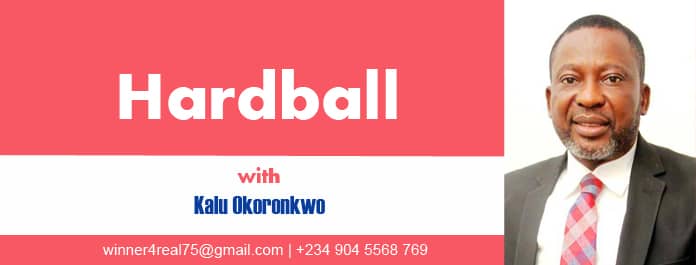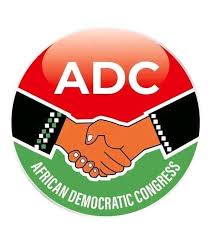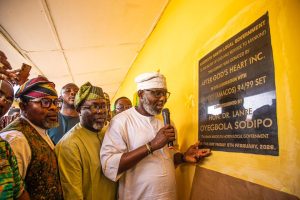
By Kalu Okoronkwo
For too long, the gospel of zoning and rotational presidency(a well-intentioned strategy to balance Nigeria’s ethnic diversity) has devolved into a tool for political manipulation, often enthroning mediocrity cloaked in ethnic or regional entitlement.
While the system may have served its purpose in dousing early fears of marginalization, the cost to national development has been precipitous: a leadership culture defined more by tribe or region than by governance aptitude.
As Nigeria inches closer to the 2027 general elections, a defining question confronts her battered citizens and political class: will Nigerians choose competence over compromise, or succumb to the age-old trap of rotational politics and ethnic appeasement? The stakes are too high, the wounds too deep, and the time too critical to take the familiar road of convenience.

2027 must not be another ritual of regional compensation, it must be a national referendum on competence, credibility, and capacity.
The truth is stark and painful: Nigeria is in crisis. Poverty is deepening, youth unemployment is soaring, institutions are weakening, and public confidence in governance is near collapse.
In this hour of reckoning, choosing a president based on rotation rather than preparedness is not just shortsighted, it is dangerous.
After nearly a decade under the leadership of the All Progressives Congress (APC), Nigeria finds herself economically bruised, institutionally broken, and morally adrift.
Insecurity festers like an untreated sore, inflation gnaws at the poor, corruption quietly flourishes in corridors of power, and public trust in government has reached historic lows. What the country desperately needs is not another transactional leader from a different geopolitical zone or a perpetuation of the status quo on the premise that it’s the turn of the zone, rather, the country needs a transformational figure with a track record of integrity, vision, and results. One who has excelled both in the public and private sectors irrespective of the geopolitical zone of such a leader. Nigeria needs a leader not because they are from the North, South, East, or West but because they have the vision, competence, experience, and moral spine to reset the broken foundations of governance.
A rotational presidency that sacrifices merit for political appeasement cannot pull Nigeria from the edge; only a competence-based presidency can.
Time and again, Nigeria has watched regional sentiment override rational scrutiny, elevating candidates not because they are best prepared to govern, but because it is “their turn.” In doing so, the nation continues to bleed from avoidable mistakes, missed opportunities, and mass disillusionment.
The current coalition of political parties especially those in opposition who envision reclaiming power in 2027 must rise to a higher patriotic calling. Zoning should no longer be a precondition for consensus. Instead, parties must adopt robust internal democracy, where every presidential aspirant, regardless of tribe or religion, tests their popularity, character, and ideas on a level playing field.
Let the primaries be open and competitive. Let competence, not compromise, shape the ticket. This is not a time for anointment in smoky backrooms or “turn-by-turn” politics. This is a time for renewed democratic courage, where the most prepared, not the most positioned, emerges.
History vindicates competence. When Italy faced a severe debt crisis in 2011, political leaders stepped aside and handed the reins to Mario Monti, an economist and former EU Commissioner. Though unelected, his technocratic government implemented tough but necessary reforms that stabilized the economy and restored investor confidence.
Singapore under Lee Kuan Yew was not transformed by tribal rotation, but by visionary leadership that prioritized results over rhetoric. Singapore’s journey from Third world obscurity to First world prosperity was led by a visionary technocrat, Lee Kuan Yew, who, through pragmatic, intelligent leadership, transformed the nation into one of the most efficient economies in the world. Rwanda’s post-genocide recovery, driven by Paul Kagame, is a product of meritocratic and strategic planning not zoning. Through Kagame, a disciplined, technocratic leader, the country rose from horror to become a model for post-conflict recovery and governance, with zero tolerance for corruption and emphasis on development.
Even in Nigeria, some of our most impactful leaders at state and federal levels earned their place through performance, not patronage.
Under Dr. Ngozi Okonjo-Iweala as Finance Minister and Leader of the Economy Nigeria negotiated debt relief from the Paris Club and introduced fiscal discipline in government spending. Her leadership in the finance ministry is still regarded as one of the few instances when professionalism guided fiscal policy. In Nigeria’s Fourth Republic, Governor Babatunde Fashola of Lagos State emerged not because of zoning but because of his technocratic pedigree and leadership acumen. His administration raised standards in infrastructure, education, and public services, setting a benchmark for others.
These examples point to a simple truth: nations rise on the shoulders of trusted, tested, and capable leaders, not rotational impostors.
Nigerians must ask themselves difficult but necessary questions: What has zoning produced over the past two decades? Has tribal representation translated into food, jobs, security, and justice? Should we continue to gamble with leadership just to maintain ethnic rotation, even at the cost of national collapse?
Again, the newly formed coalition of political parties hailed by some as another third force now stands at a moral and strategic crossroads. If they are truly serious about reclaiming Nigeria from the failed promises of the APC, then they must dare to break the mold. That means fielding a competent, visionary, and tested candidate irrespective of ethnic identity.
They must prioritize track record over tribe, performance over politics, and vision over voting blocs.
Let the candidate be someone who has built institutions, not just political alliances; has served with distinction in both public and private sectors and is respected globally and trusted locally.
2027 is not just an election year. It is a national litmus test—a moment to choose between the past and the future. Do we continue to enthrone mediocrity in the name of equity, or do we finally awaken to the responsibility of choosing leaders with proven competence and transformative vision?
The Nigeria we want cannot be built on recycled ethnicity. It must be founded on ideas, integrity, and impact. If the coalitions and political parties truly seek to rescue this nation, they must bury the politics of entitlement and raise the banners of meritocracy.
Leadership must no longer be seen as a turn-by-turn entitlement. Nigeria cannot afford another experiment in symbolic zoning while the house burns. What is required now is a bold national reawakening, a generational decision to redefine leadership based on competence, not convenience.
It is time for Nigerians to reject emotional blackmail dressed in ethnic garments. Let no political party campaign on the banner of tribe, let them campaign on ideas, on capacity, on a vision that unites, not divide.
The youth want jobs, not jingoism, women want empowerment, not empty ethnic slogans, families want food and fuel, not another sectional presidency and Nigerians want results and 2027 must reflect that urgency.
If Nigeria is to reclaim her future, 2027 must be the year of the competent candidate, a tested technocrat, a bold reformer, a unifying patriot, not just another regional representative. Only then can the country be pulled from the edge of despair to the dawn of destiny.
Leadership is the oxygen of any society. When it is handed over by default rather than by design, the people suffocate. Nigeria has suffocated long enough.
The 2027 elections must not be another ritual of regional appeasement. It must be a national reawakening, an uprising of conscience that says: we will no longer trade progress for politics, nor sacrifice competence for comfort.
The question is no longer whose turn is it? The question is: Who can turn Nigeria around?
Let the best minds lead. Let competence prevail. Let Nigeria breathe again.
Kalu Okoronkwo, a leadership and good governance advocate writes from Lagos and can be reached via kalu.okoronkwo@gmail.com




I simply could not go away your web site prior to suggesting that I really enjoyed the standard info a person supply on your guests Is going to be back incessantly to investigate crosscheck new posts
Thank you for the auspicious writeup It in fact was a amusement account it Look advanced to far added agreeable from you However how can we communicate
I like the efforts you have put in this, regards for all the great content.
Nice post. I learn something totally new and challenging on websites
Hi i think that i saw you visited my web site thus i came to Return the favore I am attempting to find things to improve my web siteI suppose its ok to use some of your ideas
Nice post. I learn something totally new and challenging on websites
I do not even know how I ended up here but I thought this post was great I do not know who you are but certainly youre going to a famous blogger if you are not already Cheers
I do not even know how I ended up here but I thought this post was great I do not know who you are but certainly youre going to a famous blogger if you are not already Cheers
Usually I do not read article on blogs however I would like to say that this writeup very compelled me to take a look at and do it Your writing style has been amazed me Thank you very nice article
For the reason that the admin of this site is working, no uncertainty very quickly it will be renowned, due to its quality contents.
I truly appreciate your technique of writing a blog. I added it to my bookmark site list and will
naturally like your web site however you need to take a look at the spelling on several of your posts. A number of them are rife with spelling problems and I find it very bothersome to tell the truth on the other hand I will surely come again again.
Gulf Telugu shaadi traditions thrive on language-specific portals.
There is definately a lot to find out about this subject. I like all the points you made
Very well presented. Every quote was awesome and thanks for sharing the content. Keep sharing and keep motivating others.
I appreciate you sharing this blog post. Thanks Again. Cool.
✅ Okey Odaları sevenler için mükemmel bir platform 👉 okey odaları
MK motors | Kıbrıs araç kiralama Kıbrıs araç kiralama , Kıbrıs araç satın al , Kıbrıs araç destek , Kıbrıs araç bakım
becem travel | Kıbrıs araç transfer Kıbrıs araç kiralama , Kıbrıs vip araç , Kıbrıs araç transfer , Kıbrıs güvenli ulaşım
very informative articles or reviews at this time.
Teknoloji Kıbrıs Teknoloji Kıbrıs, Kıbrıs teknoloji, teknolojikibris, elektronik eşyalar, Kıbrıs ucuz ev eşyası, teknolojik aksesuar kıbrıs
I do not even understand how I ended up here, but I assumed this publish used to be great
You’re so awesome! I don’t believe I have read a single thing like that before. So great to find someone with some original thoughts on this topic. Really.. thank you for starting this up. This website is something that is needed on the internet, someone with a little originality!
Attractive section of content I just stumbled upon your blog and in accession capital to assert that I get actually enjoyed account your blog posts Anyway I will be subscribing to your augment and even I achievement you access consistently fast
I just wanted to drop by and say how much I appreciate your blog. Your writing style is both engaging and informative, making it a pleasure to read. Looking forward to your future posts!
Your blog is a treasure trove of valuable insights and thought-provoking commentary. Your dedication to your craft is evident in every word you write. Keep up the fantastic work!
I am not sure where youre getting your info but good topic I needs to spend some time learning much more or understanding more Thanks for magnificent info I was looking for this information for my mission
My brother suggested I might like this website He was totally right This post actually made my day You cannt imagine just how much time I had spent for this information Thanks
Thanks I have just been looking for information about this subject for a long time and yours is the best Ive discovered till now However what in regards to the bottom line Are you certain in regards to the supply
Your blog is a constant source of inspiration for me. Your passion for your subject matter is palpable, and it’s clear that you pour your heart and soul into every post. Keep up the incredible work!
Khám phá thế giới giải trí trực tuyến đỉnh cao tại MM88, nơi mang đến những trải nghiệm cá cược thể thao và casino sống động.
iwin – nền tảng game bài đổi thưởng uy tín, nơi bạn có thể thử vận may và tận hưởng nhiều tựa game hấp
kuwin sở hữu kho game đa dạng từ slot đến trò chơi bài đổi thưởng, mang đến cho bạn những giây phút giải trí tuyệt vời.
采用高效谷歌外推策略,快速提升网站在搜索引擎中的可见性与权重。谷歌外推
采用高效谷歌站群策略,快速提升网站在搜索引擎中的可见性与权重。谷歌站群
Đến với J88, bạn sẽ được trải nghiệm dịch vụ cá cược chuyên nghiệp cùng hàng ngàn sự kiện khuyến mãi độc quyền.
Với giao diện mượt mà và ưu đãi hấp dẫn, MM88 là lựa chọn lý tưởng cho các tín đồ giải trí trực tuyến.
kuwin sở hữu kho game đa dạng từ slot đến trò chơi bài đổi thưởng, mang đến cho bạn những giây phút giải trí tuyệt vời.
Tham gia cộng đồng game thủ tại Go88 để trải nghiệm các trò chơi bài, poker phổ biến nhất hiện nay.